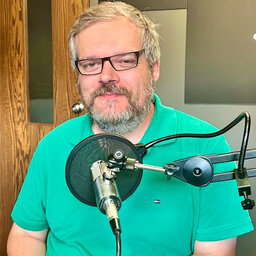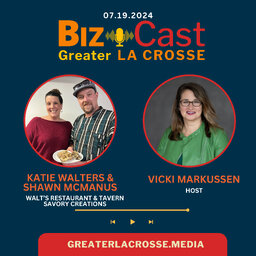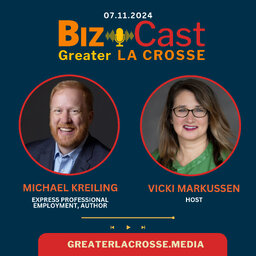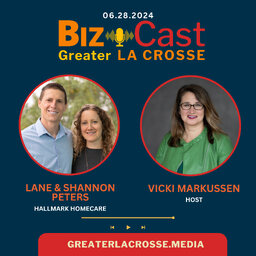
Episode 36
What Put the Lux in Luxembourg, Home of a La Crosse Sister City
About BizCast Greater La Crosse
We bring you news from the business community. From startups to experienced problem solvers, you’ll get in-depth insight on the challenges and opportunities of doing business in Greater La Crosse. Our show is a collaboration between WIZMNews.com and BizNews Greater La Crosse ( GreaterLaCrosse.media ).
Full Transcript [ generated by AI]
[00:00:01] Mark Zimer: so you have Luxembourg city was founded 963. So you have a castle, you have a more modern part of Luxembourg, and you have all these different types of foreigners .
[00:00:15] Vicki Markussen: Welcome to BizCast Greater La Crosse, a weekly podcast from BizNews. We bring you news from the business community. I am your host and founder, Vicki Markussen. My guest today is Mark Zimer. He teaches physics in Luxembourg. And I have him on. So full disclosure, I am hosting two of the Luxembourg students, two out of 25.
[00:00:39] Vicki Markussen: Correct, Mark? Yes, that’s correct. That is a big group.
[00:00:43] Mark Zimer: Oh yeah, it’s a big group. Together with five chaperones, it was a really nice group traveling through Chicago.
[00:00:51] Vicki Markussen: Yeah. Yes. And that’s like a large portion of a plane, although it’s an international flight. So yes. And so these, so what’s interesting about the school is it’s an international school and I’ve had plenty of time to talk with Stan and Nick are my students.
[00:01:08] Vicki Markussen: But let me start with the thing that surprised me. So it surprised me at, we had a potluck, good old Midwest potluck. And each of the students introduced themselves and said where they were born. And the vast majority of the 25 were not born in Luxembourg for our, so our Stan is from England. Nick is from Russia.
[00:01:31] Vicki Markussen: And. There were, I would say, a handful that were actually born in Luxembourg. So explain how that came about. How is Luxembourg this international hub?
[00:01:42] Mark Zimer: Luxembourg started to open up, I think 2025 years ago, as they realized that they need new work of, so that the social system can. stand alive.
[00:01:56] Mark Zimer: And so every year, I think a couple of thousands new workers come in. And that’s why we have so many foreigners. Right now we have probably 50, 52 percent of foreigners. So the Luxembourg is getting rare. Yes.
[00:02:11] Vicki Markussen: These days. Yes. I was joking as to whether or not the Luxembourgers say, you can only bury another Luxembourger.
[00:02:17] Vicki Markussen: But what’s, what is interesting is also at that potluck, they talked about how there are 200 people in the greater La Crosse area that have dual citizenship. So explain to people, what is the benefit of citizenship?
[00:02:35] Mark Zimer: Dual citizenship means that they have both passports. So they can have the, of course, American passport, but also the Luxembourg passport.
[00:02:44] Mark Zimer: Having the Luxembourg passport means that they can travel through Europe. Europe, the European community is borderless, like the United States, so they can travel to Germany, France, Belgium, and any other countries without getting controlled. And of course Luxembourg is the richest country of the world, so they have a lot of benefits there.
[00:03:07] Mark Zimer: And you can, if you’re interested in, you can also being part of the elections, so you like this autumn, in October, we have elections, so the dual citizenship can vote for Luxembourg government.
[00:03:18] Vicki Markussen: And my understanding, because my next door neighbor has dual citizenship, that if you track your lineage to a male, it is different than tracking your lineage to a female.
[00:03:28] Vicki Markussen: Is that correct? That’s correct. That’s much easier. So if it’s a male. You don’t have to go through the language testing. Is that correct? What’s the
[00:03:36] Mark Zimer: difference? That, I don’t know, but I know it’s much more complicated if it’s not a male. You have much more forms to fill out and going through much more stuff.
[00:03:46] Mark Zimer: And
[00:03:46] Vicki Markussen: so when you get that coveted Passport. You can fly into Luxembourg or probably not even fly into Luxembourg to start your journey, but you’re able to travel around Europe without having to get visas for every single border that you’re crossing and what you want to do. And so that’s why we have 200 plus people with it in the area.
[00:04:06] Mark Zimer: So you’re flying in Paris or Amsterdam and you can just travel around.
[00:04:10] Vicki Markussen: And Luxembourg is officially now a sister city,
[00:04:13] Mark Zimer: correct? Junglinster from Luxembourg is a sister city
[00:04:17] Vicki Markussen: of La Crosse, yeah. Yes, because Luxembourg is the country, there’s also a city, correct? Luxembourg? It’s
[00:04:25] Mark Zimer: Luxembourg City, it’s a capital city.
[00:04:27] Mark Zimer: about 100, 000 inhabitants and yeah it’s a very unique place. You have all this historical stuff, so you have Luxembourg city was founded 963. So you have a castle, you have a more modern part of Luxembourg, and you have all these different types of foreigners from anywhere. Not even from, only from France or Germany, but from Ireland, England.
[00:04:55] Mark Zimer: Greece, it’s very diverse and very multicultural. Yes,
[00:05:00] Vicki Markussen: and how the teenagers, how to call them, I’ve actually been calling them the Burger Boys. So, how the, uh, Burger Boys explained it to me is, so there are some people that still live in the outlier countries and come in to work, because Luxembourg is not very large.
[00:05:18] Mark Zimer: No, it’s very small. If you go east west you probably need an hour and north south maybe one hour and a half, so it’s very small that means like here in La Crosse housing is very rare and of course expensive and Not everybody can buy a house in Luxembourg, so they have to move to Belgium, close to the border of France or
[00:05:43] Vicki Markussen: Germany.
[00:05:44] Vicki Markussen: And you talked about how Luxembourg is the wealthiest country in the world. How did it get that way?
[00:05:50] Mark Zimer: It started with steel industries in the 60s, 70s. Then this went down, so the banks came. We had in the 80s, 90s, there was the banks and then of course there was also some crisis coming up and now it’s more into aerospace and IT.
[00:06:13] Vicki Markussen: So their industries are growing there and even the finance, my understanding is from the boys, they say there’s a bank on every corner.
[00:06:21] Mark Zimer: Yeah, still, but it’s declining.
[00:06:23] Vicki Markussen: And so finance, though, is another piece of this ripple effect, if you will, starting with manufacturing. And now some of the smarter technology, if you will, is starting to take over with I.
[00:06:35] Vicki Markussen: T. And so this is an international story. school and we Americans are always flabbergasted, it’s a very American word, about how many languages and how quickly these students learn these languages. So Nick, as it, for example, has been in Luxembourg for six years, came. not knowing English, and now he speaks it fluently.
[00:06:58] Vicki Markussen: So how is it that the embracing of international roots gets adapted, if you will, in the school?
[00:07:05] Mark Zimer: We put a lot of effort in the languages because Luxembourg, as I said before, is very small and we are surrounded by France and Germany and Belgium. So we need to talk with them and we need to understand these people.
[00:07:22] Mark Zimer: And that’s why we start at grade one with German, grade two with French, and then grade nine English is coming. And afterwards, people, or students better can choose if they want to have one or two languages, if they want to study one or two languages more. Like my son started to study Spanish last year, so he’s now also into Spanish.
[00:07:48] Mark Zimer: And you can also choose Italian or Portuguese or…
[00:07:54] Vicki Markussen: And my understanding as well is, so the 17 year olds in the group, that is the first class that this international school was created was when they came
[00:08:05] Mark Zimer: in. There’s a bunch of them here. Yeah. We started the international school five years ago.
[00:08:11] Mark Zimer: So they’re now going to a six. That means that they are grade 12 next year, so that’s the first group which started international school. Before our school was not sure what kind of profile they wanted to have, so we tried different things and finally we got into international. One reason is because Schunglinster is very international, so there are a lot of international people living around in that region.
[00:08:41] Mark Zimer: So we decided to go that way.
[00:08:44] Vicki Markussen: So you’re here, you’re here for a month, but leaving on Friday when that month is over. What have been the, what’s been the feedback you’ve heard from the students? What have they been most surprised at?
[00:08:58] Mark Zimer: The students I think Occasionally wise, most surprisingly was that the education level is higher than here.
[00:09:07] Mark Zimer: So that was one thing and that the differences of organization in high school is also one thing and of course the lunch is very different.
[00:09:19] Vicki Markussen: Yes. I’ve heard about that. And the other piece that I’ve heard too is just how sports centric we are here. So one of our students said, in Luxembourg, I’d be considered very sporty, but it doesn’t even compare to how.
[00:09:40] Mark Zimer: So I would say that we focus more on language and the Americans focus more on sports, and I think that’s a big difference in
[00:09:49] Vicki Markussen: high school. Yes, it’s all we can do to focus on one language, so. So, the students have come here. I’m guessing you’re not with them all the time. What are you working on while you’re here?
[00:10:02] Vicki Markussen: Oh my.
[00:10:03] Mark Zimer: Ha ha ha. Many things. So, of course I’m always available for the students or for the teachers if there’s a problem. But yeah, I have been meeting with a couple of other people. because I’m involved in other projects. Like yesterday I was in Winona. There is an other exchange being organized with another Luxembourgish school, with Winona, and there’s also the Mannerhaus that is a house it’s close to Winona which was built 1857, and it need to be restored.
[00:10:36] Mark Zimer: So it was built by Luxembourg at that time. It’s a stone house, and yeah, it needs, the roof needs some help, and that’s why I was driving forth and back, talking with people, and… Seeing what the Luxembourgers can do to help them.
[00:10:52] Vicki Markussen: Right. Because I’m sure they’re trying to restore it to its original, yeah, original state, which our history here is a small fraction of your long history there.
[00:11:03] Vicki Markussen: And so you are out doing some goodwill visits. The students are staying active. They’re in the school, some in central, some in Aquinas. They’re in with kids. There’s guides that are getting them through the day. They’ve switched guides after week two is my understanding. They’re experiencing the classes and the big piece for them is the
[00:11:25] Vicki Markussen: school affiliated sports after, after three o’clock or so when the school is out. So a big difference in how. our countries handle sports different is we have teams affiliated with schools versus you have clubs, correct? Correct,
[00:11:42] Mark Zimer: yeah, we have clubs and that means that if a student is interested in sport then of course they can go to a club and they don’t have to so that’s the difference and I think in high school you are automatically drawn to To the different spots and that’s a mainly difference.
[00:12:01] Vicki Markussen: Yeah, and we have obviously other there’s arts and music and, and so the big difference though is for in Europe. So we hosted a Czech girl for two years who was in basketball. And. She was so excited to play in front of students, because when you’re in a club, it might be, if you’re lucky, the parents coming.
[00:12:25] Vicki Markussen: And that’s who you’re, quote unquote, performing in front of. And so to have students and themed clothing at these events what kind of feedback did you hear from the students as to what that experience was like? And just American football,
[00:12:37] Mark Zimer: even. Yeah, the social part is really… Nice. That we don’t have when you’re young, you’re playing in front of nobody or the parents.
[00:12:46] Mark Zimer: But your social part is a big part. And I think that’s very motivating for the
[00:12:52] Vicki Markussen: students. Yeah. And another major difference too, is the ability for them to drink in Luxembourg. So we have 17 year olds, which has actually been very interesting. So they’re used to, that’s part of their socializing is being able to go out to pubs.
[00:13:08] Vicki Markussen: And here we talk about kids drinking alcohol and they get in serious trouble. And so it’s just, that to me is the stark difference of their socializing at their age versus our socializing at our age, at their age, same teenage years. And so that is, that’s just another cultural difference. So when everyone heads back on Friday.
[00:13:36] Vicki Markussen: What are some of the things, I don’t know what you are taking back from America, but what are some of the things you’ve heard some of the students taking back?
[00:13:45] Mark Zimer: I would say that they take quite a lot with them. So they saw a new culture, they have been in, in families, in host families. So they’re very close to what Americans experience every day.
[00:14:00] Mark Zimer: So I think they take a lot with them back home. When we are back home, we will… Talk about it, and we’ll have the chance to write things down. They had a diary, which they should have filled out.
[00:14:12] Mark Zimer: They had the chance to think about their experiences. And so, I’m very, I will be surprised what they will tell me in a couple of weeks. what we can learn from that.
[00:14:23] Vicki Markussen: So I can tell you some of the things that are going home in the suitcases of our two boys. So one is taking home powdered Gatorade and the other is taking home powdered Arnold Palmer mix, which is half iced tea and half lemonade.
[00:14:40] Vicki Markussen: So they’re boys. You can see where they’re motivated. But they also, because they don’t have it or it’s very different, are taking home some clothes cause they wanted to go thrifting. So they went to some of the secondhand shops and picked up some great buys and we’re going, this would cost me 80 and I just got it for 10.
[00:14:57] Vicki Markussen: So those type of experiences are, what they’re valuing, and if one of them eats one more time at Chick fil A, I’m like, really? Chick fil A again? Okay, sounds great.
[00:15:08] Mark Zimer: Yeah, we don’t have Chick fil A at home. So that’s probably why.
[00:15:11] Vicki Markussen: Yes. And then I joked to one of their parents saying, well, Stan may be able to drink in Europe, but here a 16 year old can drive.
[00:15:20] Vicki Markussen: So he’s been getting carted around by lots of people that are actually younger than he is. .
[00:15:25] Mark Zimer: Yeah that’s very different too. We start at age of 18, but you can start with your parents at the age of 17. But yeah, that’s not every… Uh, student would like to drive with their parents around, so that’s one thing.
[00:15:40] Vicki Markussen: That’s universal. Yeah. It’s across all countries. The last question for you is, where do you hope this goes? I mean, you brought these kids here for a month. It’s technically an exchange, is my understanding. So where do you want to see this go? So
[00:15:55] Mark Zimer: we are planning to have Aquinas students next May in our home.
[00:15:59] Mark Zimer: School. So we were thinking about eight to ten students. There will also come University of Wisconsin students to our school. They are from School of Education, so there’s an internship program going on. And the plan is that we’ll be back in two years, yeah.
[00:16:19] Vicki Markussen: Nice. Yeah, I think that’s how it works with the other sister cities is there’s a visit that happens one year one way and then the next way and yeah, and when you say UW Wisconsin, that’s lacrosse here.
[00:16:32] Vicki Markussen: Great. So some of the education students getting coming there and probably benefiting to see all how an international school functions.
[00:16:41] Mark Zimer: Yeah. English department. So that works very well for
[00:16:43] Vicki Markussen: them. Yes, because I’m guessing what is it Luxembourgese is that what the Luxembourgish? Yes. Yes They won’t be able to learn that one very quickly.
[00:16:52] Vicki Markussen: So But they don’t have to
[00:16:55] Mark Zimer: they don’t have to English is fine. So
[00:16:58] Vicki Markussen: yes. Well, thank you for joining me.
[00:16:59] Vicki Markussen: That is Mark Zimmer He is a teacher of physics in Luxembourg. He is here with 25 students from the International School
[00:17:08] Vicki Markussen: and they are learning about everything American. So thank you for joining BizCast Greater La Crosse.
[00:17:16] Vicki Markussen: We will catch you next week.





